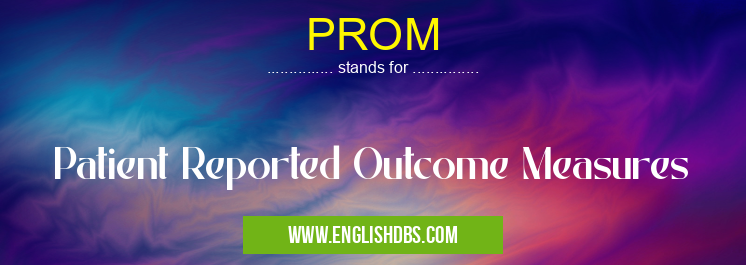What does PROM mean in CLINICAL MEDICINE
PROM is an acronym for Patient Reported Outcome Measures. It refers to a set of standardized questionnaires or surveys used to collect information about a patient's health status, well-being, and experiences with healthcare services.

PROM meaning in Clinical Medicine in Medical
PROM mostly used in an acronym Clinical Medicine in Category Medical that means Patient Reported Outcome Measures
Shorthand: PROM,
Full Form: Patient Reported Outcome Measures
For more information of "Patient Reported Outcome Measures", see the section below.
What are PROMs?
PROMs gather data directly from patients, capturing their subjective perspectives and experiences. They include questions about:
- Symptoms and health-related quality of life
- Functional limitations and ability to perform daily activities
- Emotional and mental well-being
- Satisfaction with care and treatment outcomes
Why are PROMs Important?
PROMs are valuable tools for healthcare professionals and researchers for several reasons:
- Patient-Centric Care: PROMs provide insights into how patients perceive their health and treatment outcomes. This information helps clinicians tailor care plans and make informed decisions that align with patient values.
- Monitoring and Evaluation: PROMs enable the tracking of patient health changes over time. They can identify areas of improvement and areas where interventions are needed.
- Research and Development: PROMs contribute to clinical research and drug development by capturing patient-reported outcomes and experiences.
Benefits of PROMs
- Improved Communication: PROMs facilitate better communication between patients and healthcare providers, ensuring that patient perspectives are considered in shared decision-making.
- Personalized Treatment: By understanding patient-reported outcomes, healthcare professionals can develop personalized treatment plans that address individual needs and preferences.
- Enhanced Patient Satisfaction: PROMs empower patients to provide feedback on their experiences with healthcare, leading to improved patient satisfaction and engagement.
Essential Questions and Answers on Patient Reported Outcome Measures in "MEDICAL»CLINICAL"
What are Patient Reported Outcome Measures (PROMs)?
PROMs are tools used to capture the patient's perspective on their health and well-being. They measure patient-reported experiences, symptoms, and functional status. PROMs provide valuable information that can be used to assess treatment outcomes, monitor patient progress, and inform decision-making.
How are PROMs collected?
PROMs are typically collected through questionnaires, interviews, or electronic surveys. Patients are asked to provide their input on a range of topics, such as their pain levels, mobility, ability to perform daily activities, and overall health-related quality of life.
What are the benefits of using PROMs? A: PROMs have numerous benefits, including: Patient-centered care: PROMs empower patients by giving them a voice in their own healthcare. Improved communication: PROMs facilitate communication between patients and healthcare providers, fostering a more collaborative partnership. Objective dat
PROMs have numerous benefits, including:
- Patient-centered care: PROMs empower patients by giving them a voice in their own healthcare.
- Improved communication: PROMs facilitate communication between patients and healthcare providers, fostering a more collaborative partnership.
- Objective data: PROMs provide objective data that can be used to track patient progress and assess the effectiveness of treatments.
- Enhanced decision-making: PROMs help healthcare providers make informed decisions about patient care, taking into account the patient's perspective.
What are some common PROMs?
Some commonly used PROMs include:
- SF-36 (Short Form Health Survey)
- EQ-5D (EuroQol Five Dimensions)
- PROMIS (Patient-Reported Outcomes Measurement Information System)
- OMERACT (Outcome Measures in Rheumatology Clinical Trials)
How can PROMs be used in clinical practice?
PROMs can be used in various ways in clinical practice, such as:
- Evaluating treatment outcomes: PROMs can be used to assess the effectiveness of treatments by measuring patient-reported outcomes over time.
- Monitoring patient progress: PROMs can be used to track patient progress and identify any areas of concern that may require additional attention.
- Identifying unmet needs: PROMs can help healthcare providers identify areas where patient needs are not being met, leading to improved care plans.
- Informing patient education: PROMs can be used to educate patients about their condition and treatment options.
Final Words: PROMs play a crucial role in patient-centered healthcare, providing valuable insights into patient experiences and outcomes. By capturing patient-reported data, PROMs enable healthcare providers to deliver personalized care, monitor patient health, and contribute to research and development. The use of PROMs helps to improve healthcare quality, empower patients, and advance medical knowledge.
PROM also stands for: |
|
| All stands for PROM |
